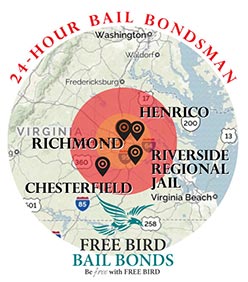Bail Bonds in Chesterfield VA: Get out of Jail
Most people are unaware of how the bail bonds Chesterfield VA location works. From locals to large companies, a number of people have realized the growing importance of getting their near and dear ones out of jail sans unnecessary hassles. While only a handful of justice systems have approved this kind of bond system, few others contain mild variations from what is commonly followed. Bail bond companies have witnessed a steady increase over the years. But whether you should approach them or not largely rests with their working style, past records and feedback from those who have utilized their services.
How the system works?
Only if an agreement has been reached at by a close family member or relative of the defendant that he or she will make a payment in exchange of the defendant’s release, temporarily on the verdict of the case, bail bonding is said to have worked. Whoever posts the bail must keep the implications in mind if the convict is found to be guilty and cannot be brought back to custody. There can arise instances when the convict fails to offer the bail money from his or her expenses, which pushes agencies to charge a certain fee. In the event of the accused disappearing, the agency is required to pay the court.
There are insurance matters that need to be figured out prior to posting the bail as well. Also, the state’s legislation regarding these bonds cannot be overlooked either.
Types of bonds
For bail bonding to work, three main types of bonds are usually dealt with:
- Cash bonds, where the accused must pay the full bail amount via cash; though few courts accept cards as well.
- Surety bonds, which are used at the time of the convict’s inability to pay the bond that the judge mentions, or worse when the accused escapes
- Property bonds, where the person’s private property including car, house, or any other similar things is used to ensure bail payment.
The best way to work out a solution
Till the time the judge actually releases the convict, it becomes imperative to contact an expert bail bondsman operating solo or in collaboration with an established company. Generally the professionals ask for vital records like the basic profile of the accused, occupation, police records to ascertain the chances of the convict escaping. There must be mutual understanding between the bondsman and also the person making the payment to the expert so that the process of bail bonding works out fine. #BailBond






